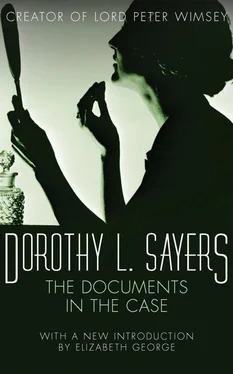‘That’s Waters all over. He’s like Sherlock Holmes. Never can resist a touch of the dramatic.’
‘No,’ said Waters. ‘It’s just native caution. Don’t want to commit myself and be made to look foolish.’
‘Oh, well, come along and we’ll get it over?’
‘Aren’t we interrupting your work?’ I said. I hope this question was prompted by politeness, but I think I spoke in a vain hope of delaying the crisis.
‘Not a bit. I’d just finished — was packing up, in fact, when I got your message.’
We traversed some more corridors and eventually came out into a large laboratory, faintly lit by a single electric bulb. An attendant was just locking a cupboard. He turned as he saw us.
‘It’s all right, Denis. I’ll see to things. You can trot away home.’
‘Very well. Good-night, Sir James.’
‘Good-night.’
Sir James switched on some more lights, flooding the gaunt room with what Poe has called somewhere a ‘ghastly and inappropriate splendour’. Stepping across to a tall cupboard labelled with his name, he unlocked it with a key that hung upon his watch-chain.
‘Here’s my bluebeard’s chamber,’ he said, smiling. ‘Relics of all kinds of crimes and tragedies. Bottled murders. Bottled suicides. Plenty of plots for novels here, Mr Munting.’
I said I supposed so.
‘Here we are, Harrison. Extract from stomach. Extract from vomit. Extract from dish of fungus. Which is it you particularly want, Waters?’
‘Doesn’t matter. Try the extract from the dish of fungus. It’ll be less open to — that is, it is possibly better for our purpose. What’s this, Lubbock?’
‘That? Oh, that’s a fresh solution of muscarine I made myself for control purposes, to assist in determining the strength.’
‘Made from the fungus?’
‘Yes. I don’t altogether guarantee that I’ve isolated the principle. But it’s near enough.’
‘Oh, yes. I’d like to have a look at that, too, if I may.’
‘By all means.’
He brought the bottles out and set them on one of the laboratory tables. In appearance they were indistinguishable — the same white salt that I had seen before in the laboratory at St Anthony’s.
Sir James Lubbock unlocked another cupboard, and produced a large heavy instrument, rather like a telescope fixed to a stand. He put it down beside the two bottles and departed in search of water. While he was preparing solutions from the respective bottles of muscarine, Waters turned to me.
‘You’d better have this quite clear in your mind — I mean, you’d like to know what you may expect to see, exactly.’
‘Yes,’ I said. ‘At present I feel rather like the good lady in The Moonstone , who wanted to know when the explosion would take place.’
‘I’m afraid it won’t be so exciting at that. Cheer up, man, you look as white as a sheet. At the further end of the instrument is a thin plate of the semi-transparent mineral, tourmaline. You’ve seen it in jewellers’ shops. Pretty stuff, and all that, and, what is more to the purpose, it has a very finely foliated structure. In a ray of ordinary light, the vibrations take place in all directions, but when passed through a slice of tourmaline they are confined to one plane, and the light is then polarised. We talked about that at dinner — you remember. This slice of tourmaline is called the polariser. Right. Now at this end, near the eyepiece, is a second slice of tourmaline, which can be rotated, and which is called the analyser. Now, when the analyser is turned so that its foliations are parallel to those of the polariser, light will pass through both, but if the analyser is turned so that its foliations are at right angles to those of the polariser, then no light will pass and there will be darkness. All clear so far?’
‘Perfectly.’
‘Very well. Now, if, when the analyser is thus turned to darkness, I place the solution of an optically active substance between the two slices of tourmaline the light will — you can tell me that yourself — it’s a band of light, remember.’
‘I remember. Yes. The band of light will be rotated as it passes through.’
‘That’s right. It will come round into line with the foliations of the analyser, and—’
‘Come through!’ said I, triumphantly.
‘Thank God for a man of intelligent mind. As you rightly say, it will come through. And therefore you will see—’
‘Light!’ said I.
(Pom, pomty; pom, pomty — if I could have got rid of that relentless drum-beat. My heart seemed to be going very heavily too.)
‘But if,’ went on Waters, with his eye on Sir James, who was stirring his solutions with a glass rod over the sink, ‘if the substance should be optically inactive — if, for example, it should turn out to be a synthetic product, prepared from inorganic substances in the laboratory — then it will not rotate the beam of polarised light. The darkness will persist.’
I saw that.
‘Well, now you perfectly understand. If, when we put the muscarine solution in the polariscope, we get light, it proves nothing. Either the stuff is natural, or else the synthetic preparation has already been split up into its two active forms, and we can make no pronouncement about it. But if we get darkness — then it’s a pretty dark business, Mr Munting.’
I nodded.
‘Well, Waters,’ said Sir James, cheerfully, ‘finished your lecture?’
‘Quite. The pupil is highly commended.’
‘Good. Now, I’m in your hands, Waters. What do you want me to do?’
‘I think we’ll have the control solution first, if you don’t mind. Now, Mr Munting you will see how this substance, prepared from the living tissue of a fungus, rotates the beam of polarised light. Right you are, sir.’
Sir James handed me a glass cylinder, filled with a colourless solution. I sniffed at it, but it had no smell.
‘I shouldn’t taste it if I were you,’ said Sir James, a little grimly. He struck a match and lit a Bunsen burner, the flame of which played upon a small mass of something held above it by a platinum projection.
‘Sodium chloride,’ said Waters. ‘In fact, not to make unnecessary mystery about it, common salt. Shall I switch off?’
He snapped off the lights, and we were left with only the sodium flame. In that green, sick glare a face floated close to mine — a corpse-face — livid, waxen, stamped with decay — sharp-shadowed in the nostrils and under the orbits — Harrison’s face, as I had seen it in ‘The Shack’, opening a black mouth of complaint.
‘Spectacular, isn’t it?’ said Sir James, pleasantly, and I pulled myself together and realised that I must look just as ghastly to him as he to me. But for the moment the face had been Harrison’s, and from that moment Lathom was nothing to me any more.
Sir James settled down to his experiment with comfortable deliberation. He placed the cylinder containing the solution in the polariscope, adjusted the eyepiece and looked. Then he turned to Waters.
‘So far,’ he said, dryly, ‘the laws of Nature appear to hold good. Do you want to see?’
‘I should like Mr Munting to see,’ said Waters. ‘Here you are. Wait a minute. We’ll take the cylinder out for a moment. Come along. You shall do it yourself.’
My heart was thumping. To my excited imagination it seemed to shake the table as I took Sir James’s place before the polariscope.
‘We’ll start,’ said Waters, ‘with the analyser parallel to the polariser. Right you are. You see your beam of light? Now here’s the adjustment. Turn it yourself.’
I turned it, and the light vanished.
‘Hold on to it,’ said Waters, cheerfully, ‘so that you can be sure there’s no hanky-panky. I’m putting the muscarine solution in again. Now then!’
Читать дальше












